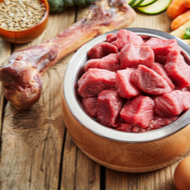Raw dog food ‘may be fuelling the spread of antibiotic-resistant bacteria'

Raw dog food was found to contain multidrug-resistant Enterocci.
Scientists are warning of an ‘international health risk’ after a study found raw dog food to be a major source of antibiotic-resistant bacteria.
In a press release for the study, to be presented at the European Congress of Clinical Microbiology & Infectious Diseases, researchers note that the trend for feeding dogs raw food may be fuelling the spread of antibiotic-resistant bacteria
Every year, an estimated 700,000 people die from drug-resistant infections – a number that is forecast to increase to 10 million by 2050 if nothing is done. The problem of antimicrobial resistance has grown so much that the World Health Organisation has declared it as one of the greatest public health threats facing humanity.
In a bid to see if pet food could be driving the rise in AMR, Dr Ana R. Freitas from the University of Porto, Portugal, and her team analysed dog food from supermarkets and pet shops for Enterococci. Enterococci is a type of bacteria that lives harmlessly in the intestines of animals and humans but can be harmful if they spread to other parts of the body.
A total of 55 samples of dog food were included in the study, including 14 raw-frozen foods, from 25 brands. The team found that all of the raw dog food samples contained multidrug-resistant Enterococci, including bacteria resistant to a last-resort antibiotic, linezolid.
Genetic sequencing revealed that some of the multi-drug resistant bacteria in the raw dog food were identical to bacteria isolated from hospital patients in the UK, Germany and the Netherlands.
"The close contact of humans with dogs and the commercialisation of the studied brands in different countries poses an international public health risk,” commented Dr Freitas. "European authorities must raise awareness about the potential health risks when feeding raw diets to pets and the manufacture of dog food, including ingredient selection and hygiene practices, must be reviewed.”



 The BSAVA has opened submissions for the BSAVA Clinical Research Abstracts 2026.
The BSAVA has opened submissions for the BSAVA Clinical Research Abstracts 2026.